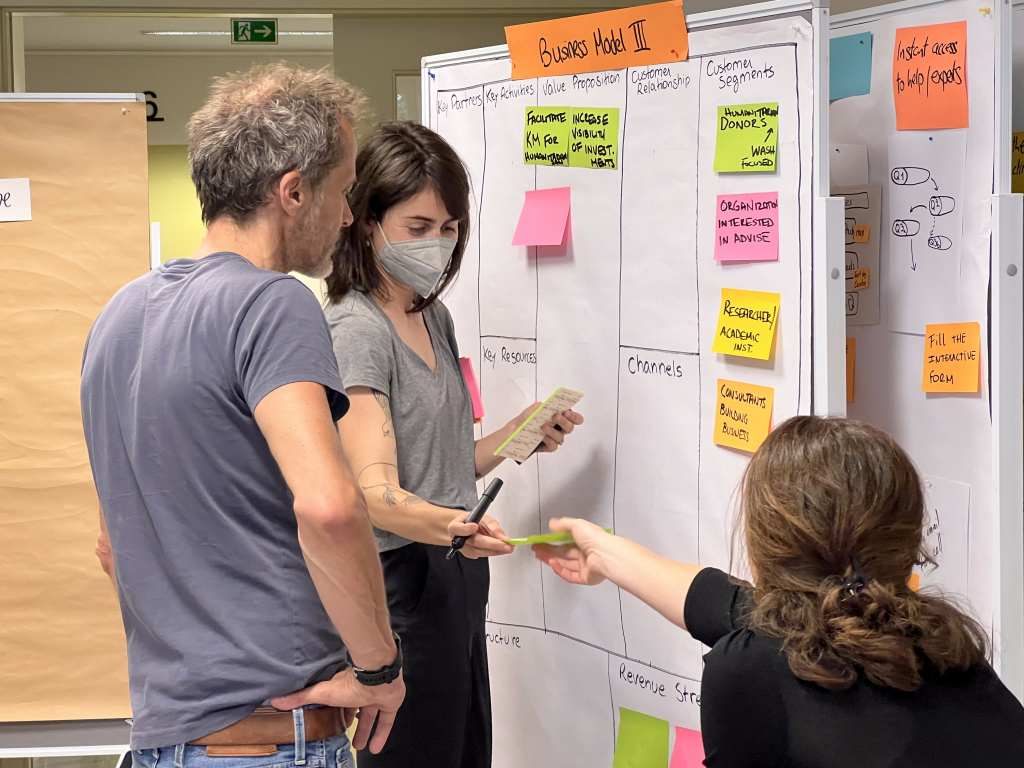SSWM
Toolbox
SDC
Worldwide
Sustainable Sanitation and Water Management Toolbox - Tangible tools and resources to solve sanitation and water management challenges

The Sani-Hub is an open source knowledge platform that improves the efficiency and effectiveness of the work in the humanitarian WASH sector by reducing knowledge and capacity gaps in faecal sludge management and sanitation.
Visit project page
Client
German Toilet Organization e.V.

Beneficiaries
The target group of the platform are humanitarian field staff and WASH practitioners involved in humanitarian sanitation response, preparedness, stabilisation and recovery action.
Key Partners
Brief Creatives
With an increase in frequency, intensity, and complexity of humanitarian crises, combined with a wide range of context and crisis settings, humanitarian sanitation is becoming more and more complex. When emergencies occur, coordination is necessary, and it can only happen if all actors have the required tools and technical capacity. The global humanitarian sanitation sector has done a tremendous job in conducting research and publishing numerous sanitation and fecal sludge management (FSM) related tools, webinars, guidelines, publications, or manuals.
For capacity building to be effective, it must result in action. Knowledge transfer, skill development, and behavior change ensure access to safely managed sanitation for all. The ability to react fast and reach the people in need is key to an effective, efficient, and coherent response. However, finding and quickly accessing relevant information for a particular context, project, or response phase remains a challenge for many practitioners in the field.
To improve coordination and humanitarian response in the WASH sector and to ensure a high quality of response regarding humanitarian sanitation, the Global WASH Cluster recognized the need for a more coordinated approach. The aim is to provide more structured information for solving sanitation and FSM related challenges in humanitarian emergency contexts. Therefore, the German Toilet Organization (GTO), together with its partners BORDA, CAWST, Eawag, GTO, IHE Delft, Netherlands Red Cross and Solidarités international of the Global WASH Cluster (GWC), aims at developing a co-created, comprehensive, structured, curated, and moderated knowledge and exchange platform for the global humanitarian WASH community. The core and the centre of the platform will be a full-featured help desk that will guide the users to the right information or means to connect them to experts, e.g., during a humanitarian disaster.
seecon, together with its partner, Brief Creatives, hosted a design sprint for all partners of SaniHub in Berlin, to narrow down on the vision, mission, and eventual design of the platform. In detail, the activities we carry out are:
Explore and discover
Different platforms in the sector were reviewed and analyzed in the lead-up to the design sprint. Stakeholders were consulted about their wishes and pain points when trying to find appropriate solutions applicable in emergency contexts.
Co-create and design
Empower
The goal of the design sprint workshop was to establish a common vision and clear objectives of the platform. Based on the principles of design-thinking, the workshop was designed as a co-creation activity, facilitating the transition from idea generation to actual implementation. Using interactive methodologies, additional ideas and input from the project consortium was gathered and organised to respond to their needs and desires and make sure that the vision of the platform is aligned among all involved parties.
Reach and connect
At the end of the design phase, seecon and Brief supported the consolidation of the creative concept and guidelines for the technical implementation and submitted a design proposal for the platform.
Do you want to learn more about how we use co-creation to develop state-of-the-art platforms and tools that resonate with the right target audiences? Drop us a line outlining your ideas and vision!
Contact us